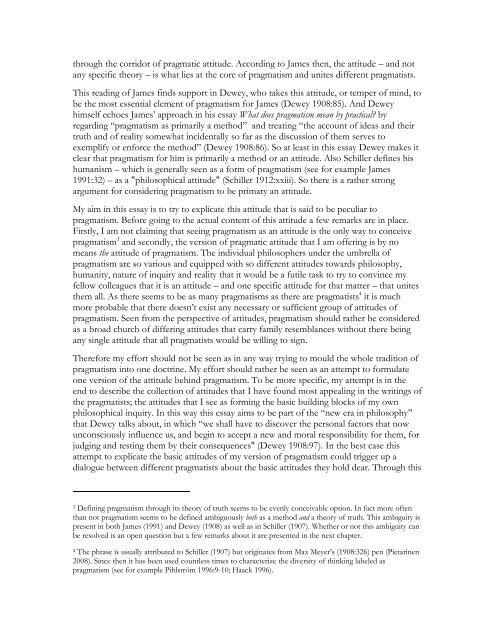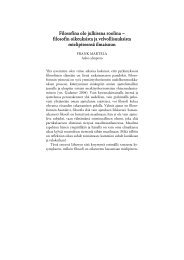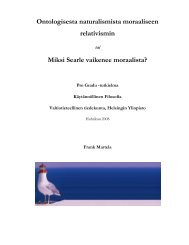Pragmatism as an attitude - Frank Martela
Pragmatism as an attitude - Frank Martela
Pragmatism as an attitude - Frank Martela
You also want an ePaper? Increase the reach of your titles
YUMPU automatically turns print PDFs into web optimized ePapers that Google loves.
through the corridor of pragmatic <strong>attitude</strong>. According to James then, the <strong>attitude</strong> – <strong>an</strong>d not<br />
<strong>an</strong>y specific theory – is what lies at the core of pragmatism <strong>an</strong>d unites different pragmatists.<br />
This reading of James finds support in Dewey, who takes this <strong>attitude</strong>, or temper of mind, to<br />
be the most essential element of pragmatism for James (Dewey 1908:85). And Dewey<br />
himself echoes James’ approach in his essay What does pragmatism me<strong>an</strong> by practical? by<br />
regarding “pragmatism <strong>as</strong> primarily a method” <strong>an</strong>d treating “the account of ide<strong>as</strong> <strong>an</strong>d their<br />
truth <strong>an</strong>d of reality somewhat incidentally so far <strong>as</strong> the discussion of them serves to<br />
exemplify or enforce the method” (Dewey 1908:86). So at le<strong>as</strong>t in this essay Dewey makes it<br />
clear that pragmatism for him is primarily a method or <strong>an</strong> <strong>attitude</strong>. Also Schiller defines his<br />
hum<strong>an</strong>ism – which is generally seen <strong>as</strong> a form of pragmatism (see for example James<br />
1991:32) – <strong>as</strong> a "philosophical <strong>attitude</strong>" (Schiller 1912:xxiii). So there is a rather strong<br />
argument for considering pragmatism to be primary <strong>an</strong> <strong>attitude</strong>.<br />
My aim in this essay is to try to explicate this <strong>attitude</strong> that is said to be peculiar to<br />
pragmatism. Before going to the actual content of this <strong>attitude</strong> a few remarks are in place.<br />
Firstly, I am not claiming that seeing pragmatism <strong>as</strong> <strong>an</strong> <strong>attitude</strong> is the only way to conceive<br />
pragmatism 3 <strong>an</strong>d secondly, the version of pragmatic <strong>attitude</strong> that I am offering is by no<br />
me<strong>an</strong>s the <strong>attitude</strong> of pragmatism. The individual philosophers under the umbrella of<br />
pragmatism are so various <strong>an</strong>d equipped with so different <strong>attitude</strong>s towards philosophy,<br />
hum<strong>an</strong>ity, nature of inquiry <strong>an</strong>d reality that it would be a futile t<strong>as</strong>k to try to convince my<br />
fellow colleagues that it is <strong>an</strong> <strong>attitude</strong> – <strong>an</strong>d one specific <strong>attitude</strong> for that matter – that unites<br />
them all. As there seems to be <strong>as</strong> m<strong>an</strong>y pragmatisms <strong>as</strong> there are pragmatists 4 it is much<br />
more probable that there doesn’t exist <strong>an</strong>y necessary or sufficient group of <strong>attitude</strong>s of<br />
pragmatism. Seen from the perspective of <strong>attitude</strong>s, pragmatism should rather be considered<br />
<strong>as</strong> a broad church of differing <strong>attitude</strong>s that carry family resembl<strong>an</strong>ces without there being<br />
<strong>an</strong>y single <strong>attitude</strong> that all pragmatists would be willing to sign.<br />
Therefore my effort should not be seen <strong>as</strong> in <strong>an</strong>y way trying to mould the whole tradition of<br />
pragmatism into one doctrine. My effort should rather be seen <strong>as</strong> <strong>an</strong> attempt to formulate<br />
one version of the <strong>attitude</strong> behind pragmatism. To be more specific, my attempt is in the<br />
end to describe the collection of <strong>attitude</strong>s that I have found most appealing in the writings of<br />
the pragmatists; the <strong>attitude</strong>s that I see <strong>as</strong> forming the b<strong>as</strong>ic building blocks of my own<br />
philosophical inquiry. In this way this essay aims to be part of the “new era in philosophy”<br />
that Dewey talks about, in which “we shall have to discover the personal factors that now<br />
unconsciously influence us, <strong>an</strong>d begin to accept a new <strong>an</strong>d moral responsibility for them, for<br />
judging <strong>an</strong>d testing them by their consequences" (Dewey 1908:97). In the best c<strong>as</strong>e this<br />
attempt to explicate the b<strong>as</strong>ic <strong>attitude</strong>s of my version of pragmatism could trigger up a<br />
dialogue between different pragmatists about the b<strong>as</strong>ic <strong>attitude</strong>s they hold dear. Through this<br />
3 Defining pragmatism through its theory of truth seems to be evenly conceivable option. In fact more often<br />
th<strong>an</strong> not pragmatism seems to be defined ambiguously both <strong>as</strong> a method <strong>an</strong>d a theory of truth. This ambiguity is<br />
present in both James (1991) <strong>an</strong>d Dewey (1908) <strong>as</strong> well <strong>as</strong> in Schiller (1907). Whether or not this ambiguity c<strong>an</strong><br />
be resolved is <strong>an</strong> open question but a few remarks about it are presented in the next chapter.<br />
4 The phr<strong>as</strong>e is usually attributed to Schiller (1907) but originates from Max Meyer’s (1908:326) pen (Pietarinen<br />
2008). Since then it h<strong>as</strong> been used countless times to characterize the diversity of thinking labeled <strong>as</strong><br />
pragmatism (see for example Pihlström 1996:9-10; Haack 1996).






